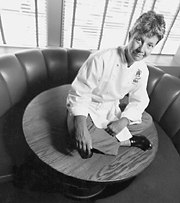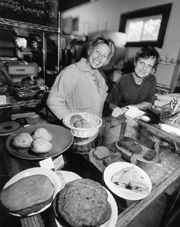TO OUR GLASSY mahogany table came dish after steaming, fragrant, beautiful dish, and we ate. We ate and ate and ate. We ate cha gio ($6), plump, crackling spring rolls amply stuffed with minced pork and rock shrimp and dipped into the fish sauce nuoc cham. We ate fresh salad rolls ($6.50), their shrimp, pork, vegetables, vermicelli noodles, herbs, and ruffled lettuce leaves spilling lushly out of delicate little rice paper casings. We ate grilled la lot beef ($7), neat little packages of minced beef wrapped in la lot greens and served with leafy mint. We ate banh tom ($8) and thanked god for the gift of fried food, nibbling the tempura-like halos from sweet potatoes and shrimp and sinking our teeth into the succulent meat.
And that was just the starters.
Giao’s 2311 Second, 770-0270 lunch, Mon-Sat, 11:30-5; dinner, Sun-Thu, 5-10, Fri-Sat, 5-11 AE, D, MC, V; full bar
We ate like we were in a little Hanoi hole-in-the-wall, which we had only to glance up from the table to see was clearly not the case. For Giao’s, the latest entrant in the let’s-see-how-many-diners-Belltown-can-really-draw sweepstakes, is the anti-hole-in-the-wall, the ber anti-hole-in-the-wall, taking its place alongside Monsoon and Obachine and Blowfish and Wild Ginger in purveying upmarket Asian (in this case, Vietnamese) food amidst considerable aesthetic sophistication. This it does with a pile of shareholder bucks behind it; Giao’s is the enterprise of an outfit called Dunamis Corporation, which markets a line of Asian soup mixes in the US and Canada.
A lot of those shareholder bucks have been spent on Giao’s decor. The wall of the bar is vivid cerulean blue, shimmering with a mural of silvery bamboo leaves. Fused-glass ceiling fixtures and stunning woven bamboo wall hangings collaborate to lend the place a sleek, Canlis-y class, from the full bar street-side to the dining room to the private party room in back.
So Giao’s is handsome, no question; but it’s handsome at you, like a stage set, rather than for you, like the best of welcoming restaurants. Likewise the servers, who—though unfailingly gracious—exhibit a kind of disconnect from the place they represent and the food they serve. You ask one of them the chef’s name and he wrinkles his brow; do I mean the kitchen manager who’s cooking or the executive chef who wrote the menu? You ask another what she thinks of the “shaking” beef and she’s not sure; she’s a vegetarian. Perhaps this is no fault of the servers, who have likely been trained to take pride in the corporate stature of Giao’s above all else. The Seattle outpost, one learns, is being treated as the prototype for a whole fleet of future Giao’s. In this way Giao’s is the Ruth’s Chris Steak House of Vietnamese restaurants—which I mean less as a criticism than as a simple reality check.
All of which is very interesting, considering who that executive chef turns out to be: Andre Nguyen, chef-owner of the heralded Andre’s Eurasian Bistro in Bellevue. (He’s still cooking at that terrific storefront restaurant, checking in at Giao’s in more of an overseer’s capacity.) No wonder the appetizers were so toothsome, we reflected, as our party of nine ordered the heck out of dinner.
AS IT TURNED out, the “shaking” beef ($17) offered reason aplenty to ditch your vegetarian ideals. It was the tenderest of tenderloin, tenderly tended at the wok with onions and served with sweet butter lettuce cups. But vegetarians hardly suffer here, with five entrees to choose from plus plenty of fish dishes. One, monk’s dish ($8.50), featured bamboo shoots and shiitakes along with a whole garden of vegetables, braised in a clay pot with fried tofu. Very nice, rich and earthy, but where was the tofu? Our waiter brought us a little dish of the stuff to dump in after we convinced him it was missing.
Another clay pot dish, catfish braised in caramelized sauce ($13.25), registered far too briny for my palate, but I was voted down by the devotees at my table. The fish was delectably moist, no question. So was the broiled salmon ($15.95), flooded in a sweet, sweet tamarind-honey-soy sauce, and all crispy-spicy on the outside. My tho fried fish ($9.50/lb.), one of four dishes-to-share on the menu, was a whole striped bass, crisped to a nice crackling exterior and seasoned beautifully with lemon grass. This dish was lovely, presented with pretty tendrils of carrot and beet and great mounds of fluffy greens, along with rice paper for wrapping and nuoc cham for dipping.
Eggplant farci ($12.95) was fascinating and flawed: braised Chinese eggplant cooked to mushiness, stuffed with delicious minced pork and shrimp. Chef’s favorite chicken ($13.95) was also filled with pork: Boneless legs—with most of the moistness cooked away, alas—were stuffed with a savory blend of pork, peas, onions, and mushrooms. Charbroiled lemon grass chicken ($13.50) was even more regrettably dry—inedibly so, in fact. So were the tough singing prawns ($16.50), which were served amply peppered in a strongly seasoned fish sauce tinged with coconut juice alongside a beautiful array of lightly steamed fresh vegetables (including the spinachlike Vietnamese leafy green la lot.)
EXECUTION, EXECUTION, execution: Why is a pro like Nguyen allowing such correctable errors as leaving out ingredients and overcooking meats? This is, after all, a restaurant of some pretension, the downside of dining at the ber anti-hole-in-the-wall being that you pay considerably more for the pleasure. (You will, for example, pay an extra buck-fifty for your rice, which will either be lightly fragrant steamed jasmine, sturdy brown, or sticky rice steamed chlorophyll-green from its bath in banana leaves and lightly redolent of coconut.)
Desserts are satisfyingly foreign to the American palate (with the exception of an eggy coconut cr譥 brl饬 $4.50) and quite delicious. Banh nep chuoi ($5) is a warm sticky rice roll filled with banana. Banana frizzel ($6.50) fries the banana, then serves it with cinnamon-kissed vanilla ice cream. Che khoai mon ($6), my favorite, was a creamy taro-root rice pudding with a dazzling coconut cream sauce.
It felt right to end the dinner on this note of culinary intrigue; at its best, Giao’s offers in its food the culinary intrigue its corporate atmo belies. Would that it were more often at its best.







